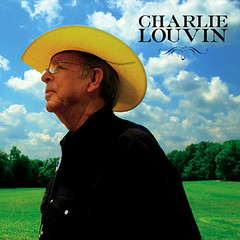Darrin James, Thrones of Gold
Darrin James distills hard-edged soul and craggy Americana into a redolent tincture that I’ve come to think of as New York City Melting Pot. His gravelly voice and confident, grungy guitar work lend themselves equally well to rock and blues (“Trivial”), old-timey piano-driven numbers (“Had Enough of Me”) and blue-eyed soul (“Hate That Word,” “Duct Tape”). There’s the obligatory, grim, Nick Cave-like folk ballad (“Herie”), but this one has a tumbling beat that takes it into original waters. Mandolin and ukulele feed the gentler folkiness of “Dusty Road,” while haunting organ and thudding upright bass give other songs the slightly eerie, organic quality that Americana producers strive for.
James produced the CD himself, with expert support from a set of fine musicians. It’s well-crafted all the way through. The only misstep is “Faith on the Run,” which would be an excellent song but for an uncomfortable resemblance to Tom Petty’s “Last Dance with Mary Jane.”
Its literate lyrics and subject matter are a big part of why Thrones of Gold stands as one of the best indie productions of the year so far. “Long lost, slightly sauced/And swingin’ from a vine/She was a dose of imperfection/Left me danglin’, out of time/I sold my disposition for a nickel and a dime/But now she’s had enough of me.” “Lucky Man,” on the other hand, expresses the eternal strangeness of the situation of the more successful male: “I’m a Lucky man/I know who I am/Never done the best that I can/So I’m Lucky that I got you.”
Politics and worldliness run through a number of songs. The subject of “Herie” “fought in the war for Iran/He had a dream of freer land/His family was murdered/In front of his eyes/But I’ve never seen him cry.” Meanwhile, you can almost picture the narrator of the title track sitting in a weirdly angular apartment deep in Brooklyn, watching war news on TV, wringing his hands, and dreaming:
I’m goin’ somewhere I’ve never been
My life here is at an end
I’ll be an honest man with a calloused hand
Goin’ where people don’t work so hard
No one’s gonna show me no business card
I’m outta here.
Available, with extended clips, at CD Baby.
Karen Jacobsen, Kissing Someone Else
Karen Jacobsen, an Australian singer-songwriter-pianist now based in (yawn) New York (everyone seems to come here sooner or later), has an excellent melodic sense, and her clear, unaffected voice actually deserves the often-overused term “angelic.” Her lyrics range from sinewy (“If I am so amazing why is everything so crazy?”) to overly cliched (“my life is a tomb of endless broken dreams”), but her innocent-sounding delivery and skill at choral arranging make the sentiment go down easier, and the strong melodies solidify the whole CD. Hooky pop-rockers like “So Fast”, “Afterthought,” and the title track, as well as ballads like “The River of My Life” and quirky, heavily arranged pieces like “Merry Go Round” all display these talents.
The key difference between Jacobsen and most pop singers is that she makes virtually no effort to sound sexy. This works in Christian rock, but what about in mainstream pop music? I guess we’ll find out. The real question is whether the twenty-first century wants its own Petula Clark. I don’t see why not. But then, do I look like a century? Don’t listen to me, listen to Karen Jacobsen. Hear songs and samples at her website and at CD Baby.
Chase Pagan, Oh, Musica!
Chase Pagan makes driving piano-powered rock, but it would be wrong to pigeonhole him with the likes of Keane, for his musical vision is considerably more original than any rock the major labels are putting out. Reaching for comparisons, one might say that if Radiohead, Kurt Weill, and The Mars Volta got together and made a CD of carnival music, you’d have Chase Pagan.
He doesn’t so much sing as wail and keen, gasping for breath, drifting up and down his tenor and falsetto range like Jeff Buckley with a pin stuck in him, supporting his heavy piano parts with grouchy guitars and punk-inpired bass and drums. “Push My Buttons,” a titanic groan of avant-garde pain, is the centerpiece of the CD. The songs draw on elements of arty grunge (“Time to Myself”), folk (“Paperboat”), twisted country (“Sailors March”), children’s music (“Spanish Tongue”), other styles, and things not known as they assault the ear like rusty bolts from the blue.
There’s quite a bit of dense, interesting chamber rock coming out these days. I think it’s the result of an information overload. Rock has gone through so many movements and iterations that new artists with unusual talent are forced first to drown in an excess of input, then to flee to the upper atmosphere with no skin on. With this CD Chase Pagan leaps to the forefront of this movement, chasing the shards of his own heretical rainbow.
You can download the accompanying EP, which contains some of the same tracks as the full-length CD, for free at his website, or hear some full tracks at his Myspace page. The EP also contains a cover of “Play the Game” by Queen, clearly another of Pagan’s inspirations.
Eli Cook, Miss Blues’es Child
Eli Cook is a twenty-year-old blues guitar wizard with genuine soul. His first acoustic recording consists of old and new songs played in raw, live-sounding arrangements with little more than Cook’s acoustic guitar and voice, plus banjo accompaniment by the stalwart Patrick McCrowell. Cook’s playing is a joy, and his original songs fit smoothly with his thoughtful covers of Robert Johnson, Son House, traditional songs and the like. Highlights include “Terraplane Blues,” “Goin’ Down South” (also recorded recently by one of my favorite new roots bands, Hillstomp), and the original title track.
Cook’s raucous take on “Fixin’ To Die” shows his mastery of incessant, scratchy electricity. By contrast, the satisfying, seven-minute-long “Trick Bag,” an original, demonstrates his sensitivity to the importance of empty space, something young performers don’t usually develop so early in their careers.
Cook sings with the mix of grimness and sensitivity that the material demands, but tries too hard to sound like an older man, putting too much force into his baritone. It makes him sound a little like one of the Eddie Vedder imitators who crawled onto the music scene in the 1990s. It doesn’t detract from the louder songs like “Fixin’ To Die,” but drags down the trance and country blues numbers.
Still, though he would be more convincing if he relaxed his voice some, Cook’s fine guitar work and top-notch material make this CD a very worthwhile listen. Eli Cook is a talent to reckon with.
Hear extended samples at CD Baby.
Scotty Don’t, Scotty Don’t
This twenty-minute EP rips through a quick survey of pop styles. “Back Porch” has a 1970s classic rock jam vibe. “When I Say” starts as a not very original reggae jam a la Bob Marley’s “Is This Love,” but then bursts into a punked-up ska-rock section that somehow makes perfect sense. “…Different Kind” suggests James Gang grooviness, and “Punk Rock Lullaby” is exactly that. “Everything’s Alright” goes back to the loose 70s flavor of the opening track, and the EP ends with a spacey-cool, acoustic miniature about being busted for smoking dope.
The trio is the original project of Badfish, a bizarrely successful Sublime tribute band. Given that genesis, it’s not surprising that their strong points include high quality songwriting, tight vocal harmonies, and a light touch. I don’t know to what extent the harmonies can be reproduced at a live show. But the band’s combination of bubbly enthusiasm and sneaky craft make their new project eminently worth checking out.
Hear several tracks at Scotty Don’t’s Myspace page.


